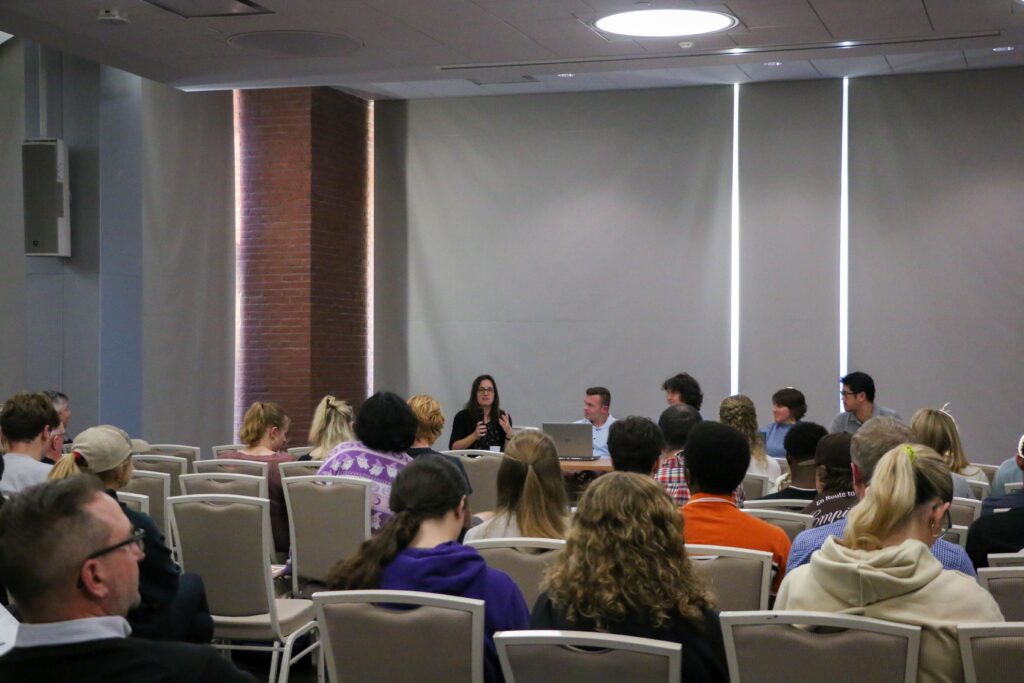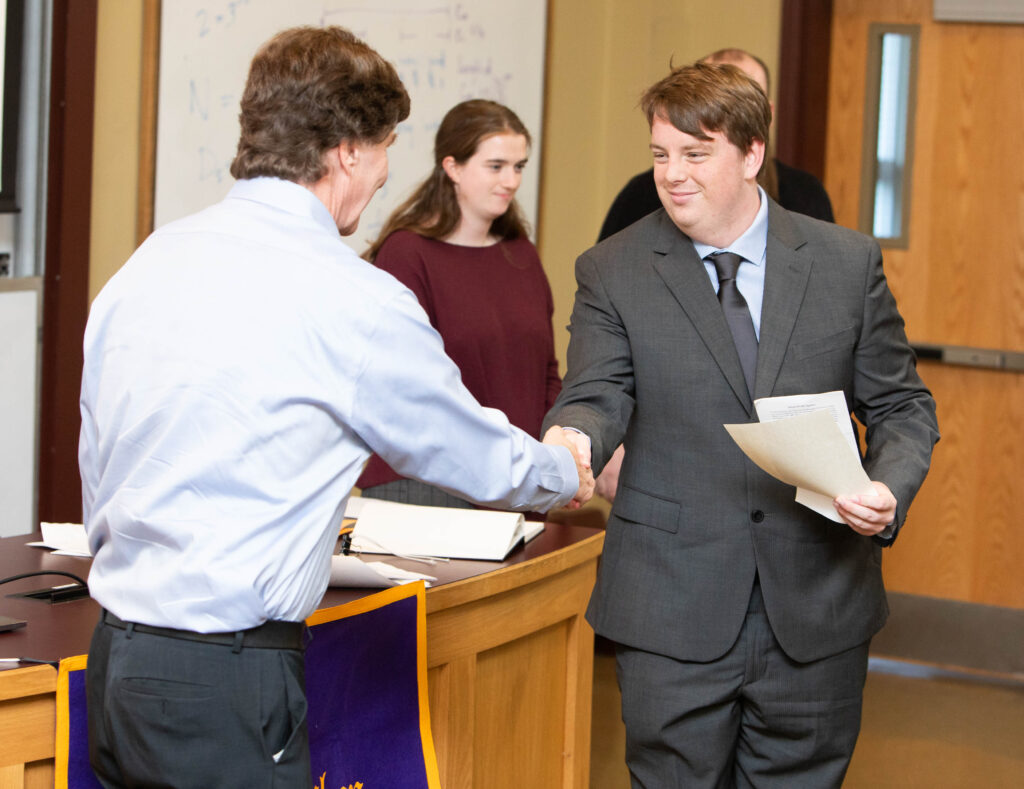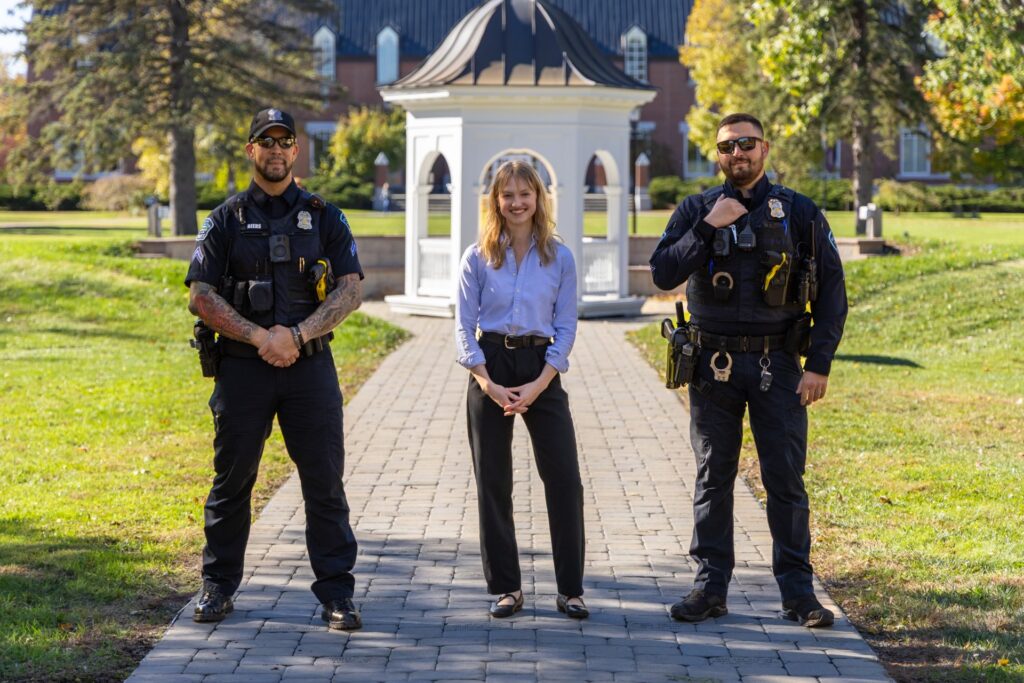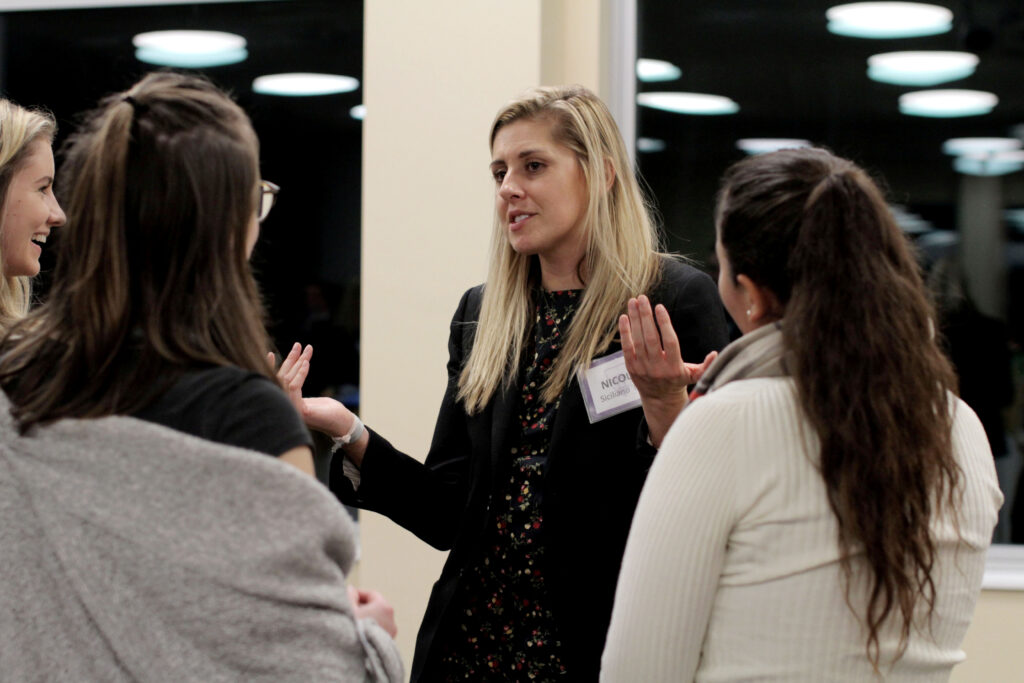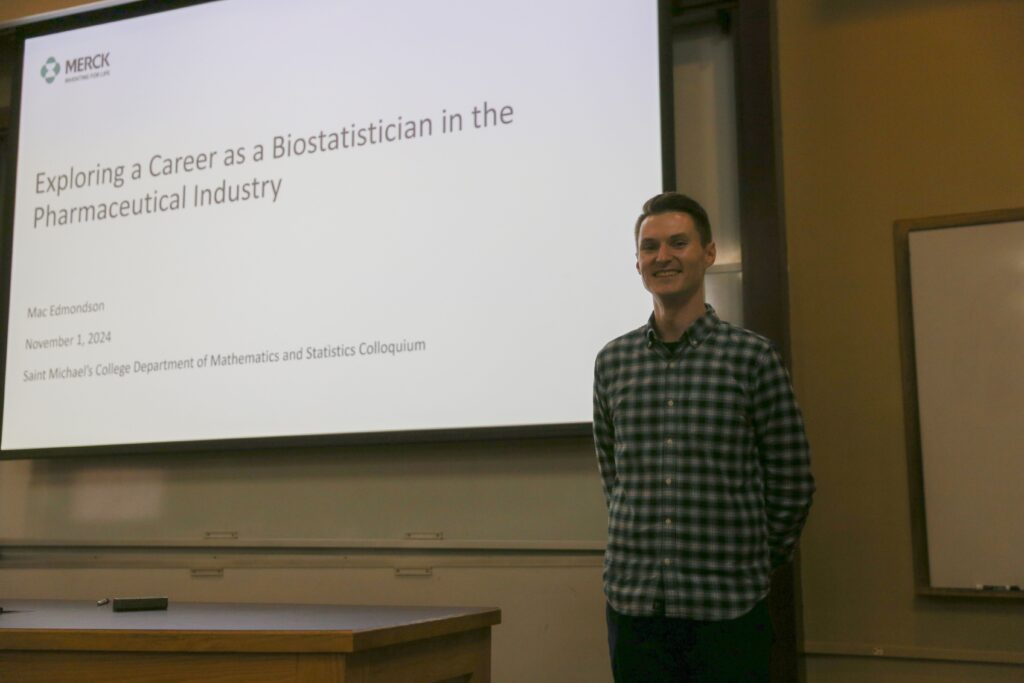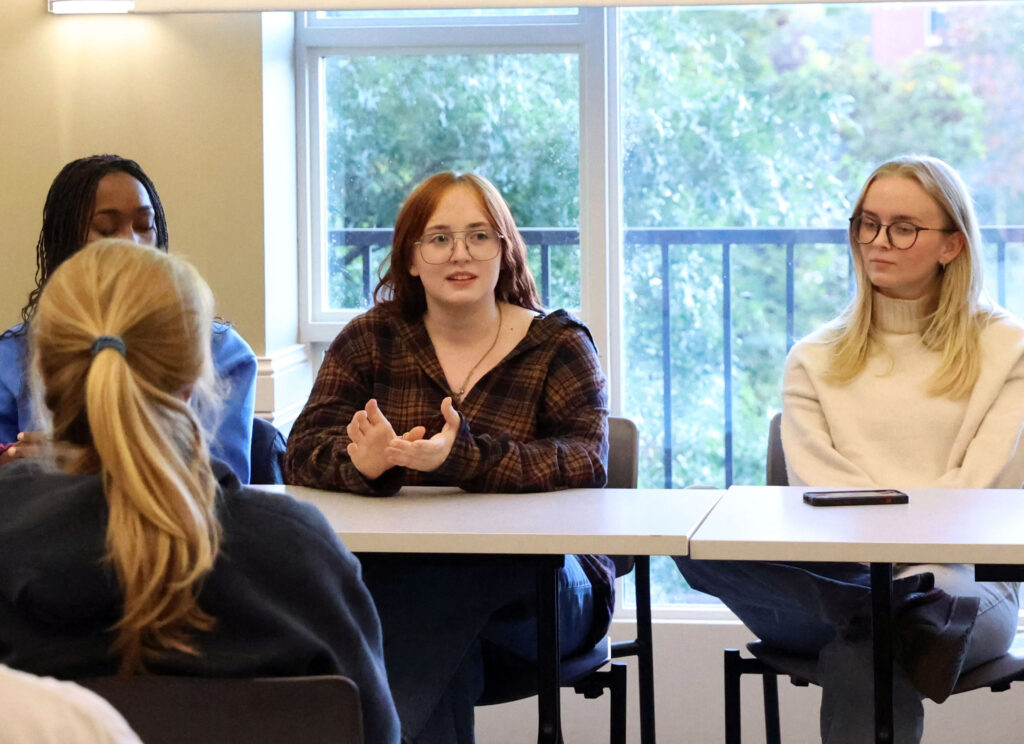Saint Michael’s alumni, faculty share insight on the ethics, use, and future of artificial intelligence
Three Saint Michael’s College alumni and a professor recently participated in a panel discussion on what the future will look like with artificial intelligence (AI), sharing their own examples of uses, cautions, and lessons from their professional fields.
The alumni on the panel, alongside Philosophy & Ethics Professor Crystal L’Hote, said they felt grateful to be able to return to campus to share their knowledge with current students.
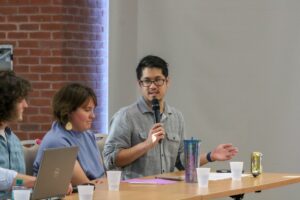
Saint Michael’s College Assistant Director of Digital Media Technologies Chris Lei moderated a panel discussion on the use, ethics, and future of artificial intelligence on Oct. 1, 2024. (Photo by Sophie Burt ’26)
The event was held on Oct. 1 in the Dion Center Roy Room, and many students and faculty attended. The panel was a collaboration by the Henry “Bud” Boucher, Jr. ’69 Career Education Center and the Departments of Business Administration & Accounting, Computer Science, and Philosophy & Ethics. Chris Lei, Assistant Director of Digital Media Technologies, introduced the panelists and moderated the discussion.
Artificial intelligence is becoming a popular tool for many people in their professional and personal lives, and it is important to recognize where the benefits and harm of using artificial intelligence, the panelists said.

Kellie Campbell ’08, Chief Information Office for the Vermont State Colleges, served as a panelist during a discussion about artificial intelligence at Saint Michael’s College on Oct. 1, 2024.. (Photo by Sophie Burt ’26)
Impacts on higher education
Kellie Campbell ’08, Chief Information Officer for the Vermont State Colleges, said that education will be the most affected field in the future of artificial intelligence. She said that because so many students are already using Chat GPT (a generative artificial intelligence chatbot), AI’s place in education is only going to accelerate.
“AI literacy is going to be absolutely fundamental to a healthy society moving forward,” Campbell said.
She said that underrepresented communities who do not have access to artificial intelligence may be at a significant disadvantage moving forward because they will not have the same literacy as people who are in higher areas of education.
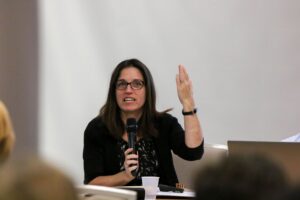
Saint Michael’s College Philosophy & Ethics Professor Crystal L’Hote discusses the ethics of artificial intelligence during a panel discussion on Oct. 1, 2024.
AI ethical tradeoffs
Professor L’Hote, Ph.D. shared her own insights on artificial intelligence, specifically in instances where ethics and morals relate to the use of AI.
L’Hote said that the baseline use for artificial intelligence is to make one’s life easier, yet there is a huge give and take when it comes to using these AI shortcuts.
To display this tradeoff, she used the analogy of a GPS to explain how people are starting to lose important skills due to their reliance on technology.
L’Hote asked the audience to point in the direction of west and commented on how the older folks in the audience had a better sense of direction than the younger people. She said this is because everyone uses a GPS now, and a keen sense of direction is not always necessary to succeed in a super technological society as exists nowadays.
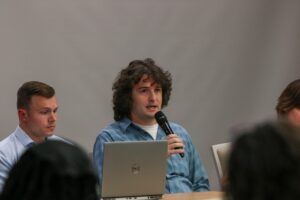
Thomas Dickerson ’13, Chief Science Officer of Geopipe, participates in a panel discussion about artificial intelligence at Saint Michael’s College on Oct. 1, 2024. (Photo by Sophie Burt ’26)
Correcting misconceptions about AI
Thomas Dickerson ’13, Ph.D., Chief Science Officer at Geopipe, triple majored in computer science, physics, and mathematics during his time at Saint Michael’s College. Dickerson said that he creates geospatial data about the world using artificial intelligence.
Dickerson put emphasis on how the term “AI” can be misleading.
“AI, in a lot of ways, is a marketing term,” Dickerson said. “It’s kind of a catch-all for a lot of different techniques that broadly fall under the umbrella of getting computers to do pattern matching, and then also extrapolating from data.”
Dickerson said that because of how broad artificial intelligence is, all forms of media use it, spanning from streaming services to a simple Google search – “everything uses AI now,” he said. This causes AI to be morphed into an umbrella term that addresses all varieties of media, Dickerson said.
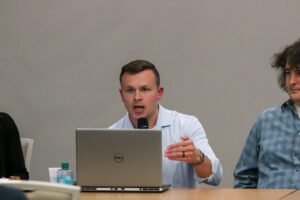
James Watson ’12, a Solutions Architect at Honeywell, participates in a panel discussion about artificial intelligence at Saint Michael’s College on Oct. 1, 2024. (Photo by Sophie Burt ’26)
How AI makes life easier
James Watson ’12, a Solutions Architect at Honeywell, said he was a panelist for this event because he uses artificial intelligence every single day in his work schedule.
Watson believes that AI can be useful and makes his job a lot easier.
“The key thing here is to kind of embrace it but do so with a bit of skepticism and a bit of curiosity,” Watson said.
When it comes to applying AI to his own career, Watson said, “(AI) is basically the elimination of wasted time and the improved productivity of work.”
“AI is effective for me in my daily workflow, and I can use it to basically get rid of non-value-added time blocking things that I do every day that add no value to my customers, but I just got to crunch this one thing,” Watson said. “I’ve gotten that expense report every two weeks. What used to take me like two or three hours? Now it takes about 30 minutes.”
Watson benefits from artificial intelligence greatly when working with software and number crunching, but he emphasized the importance of “staying skeptical” when working with AI.
As all the panelists addressed, artificial intelligence can implement value and productivity in life, but there is always a tradeoff with technology. Society needs to be mindful as AI is rapidly progressing, they all emphasized.
“There’s still value in the grit,” Campbell said.

For all press inquiries contact Elizabeth Murray, Associate Director of Communications at Saint Michael's College.
